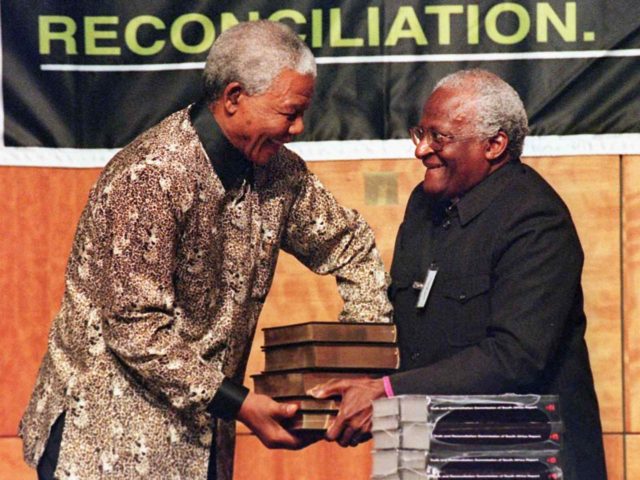Archbishop Desmond Tutu, an Anglican cleric who broke racial barriers and helped lead the anti-apartheid movement, eventually winning the Nobel Prize for Peace in 1994, passed away Sunday in Cape Town at the age of 90.
Tutu’s lasting legacy to South Africa and the world is the principle that oppressed people should equally obey principles of justice and human rights in their struggle. It was a principle he was to abandon in his later support for the Palestinians against Israel.
As Independent Online noted in its obituary, Desmond Mpilo Tutu was born on October 7, 1931, in the northwestern city of Klerksdorp. He wanted to become a doctor — a narrow and difficult path for black students, who faced many barriers to their education — but could not afford the costs, and became a teacher instead before joining the clergy.
Tutu was appointed the first black archbishop of Johannesburg and then of Cape Town in the 1980s, when the anti-apartheid struggle was at is most intense.
He became a voice for the anti-apartheid movement, notably the United Democratic Front (UDF), the domestic coalition that formed in 1983 to oppose the regime while the banned African National Congress (ANC) was still in exile.
Tutu was a powerful advocate for non-violence as a tactic, though he defended the ANCs decision to adopt violence once non-violent methods of protest against the apartheid regime had proved ineffective, given the regime’s violent response.
In his Nobel Prize lecture, Tutu called South Africa’s apartheid system “totally indefensible,” noting its immoral racial foundations and the “phalanx of draconian laws” through which it attempted to repress political dissent.
He also declared: “We in the South African Council of Churches have said we are opposed to all forms of violence – that of a repressive and unjust system, and that of those who seek to overthrow that system. However, we have added that we understand those who say they have had to adopt what is a last resort for them.”
That somewhat contradictory approach to the use of violence was to be tested after the country’s first non-racial democratic elections in 1994, when Tutu was appointed to chair the Truth and Reconciliation Commission (TRC). The TRC, based on earlier models from Latin America, aimed to expose the truth of human rights abuses during apartheid. Perpetrators would be considered for amnesty from prosecution if they made full confessions.
The TRC was not limited to exploring the abuses of the apartheid regime, but also considered human rights abuses by the ANC in its violent struggle, which included the brutal assassination of suspected traitors and informants.
Against those in the ANC who argued that a liberation movement on the “right” side of history could not be judged by the same moral standard as those defending an oppressive system, Tutu insisted that the principles of human rights applied equally to all.
It was a principle Tutu was to abandon in his support for the Palestinian cause.
Tutu joined radical anti-Israel activists in comparing Israel to “apartheid” South Africa, a false analogy that led to a backlash among Tutu’s many Jewish admirers in South Africa and around the world. Critics noted antisemitic themes in his comments on Israel and Jews, such as the argument that Jews had to be judged by a different standard. Some also pointed to evidence of “replacement theology” in his thinking, according to which Christianity had displaced Judaism and therefore Jews could not claim sovereignty in Israel.
It was a moral blind spot that damaged Tutu’s ambition to encourage peaceful resolutions to conflicts throughout the world.
Nevertheless, Tutu will be remembered for his role in the anti-apartheid struggle, and for his affable humility. This author met him several times, notably at a Midnight Mass in Cape Town, where he stood by the door, greeting everyone as they left.
Joel B. Pollak is Senior Editor-at-Large at Breitbart News and the host of Breitbart News Sunday on Sirius XM Patriot on Sunday evenings from 7 p.m. to 10 p.m. ET (4 p.m. to 7 p.m. PT). He is the author of the recent e-book, Neither Free nor Fair: The 2020 U.S. Presidential Election. His recent book, RED NOVEMBER, tells the story of the 2020 Democratic presidential primary from a conservative perspective. He is a winner of the 2018 Robert Novak Journalism Alumni Fellowship. Follow him on Twitter at @joelpollak.

COMMENTS
Please let us know if you're having issues with commenting.